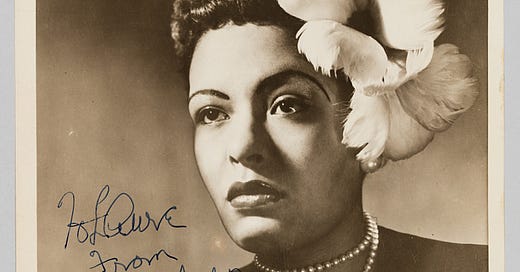Please note: Billie Holiday experienced and sang about traumatic events. Some are included in this story.
"Billie Holiday—she was the nicest woman in the world, you know. All she wanted to do was sing." - Miles Davis
Early Years
Her mother was thirteen, pop was fifteen at the time of Billie's birth. Just kids. Unwed. And poor. They named their daughter Eleanora. Her last name was Fagan. It came from a plantation owner who fathered sixteen children with Billie's great-grandmother, an enslaved woman.
About her name, Billie would say,
"My name, Eleanora, was too damn long for anyone to say. Besides, I never liked it. Especially not after my Grandma shortened it and used to scream "Nora!" at me from the back porch. My father had started calling me Bill because I was such a tomboy. I didn't mind that, but I wanted to be pretty, too, and have a pretty name. So I decided Billie was it and I made it stick."
Born in Philadelphia in 1915, Billie's early years were spent living in Baltimore, where both of her parents were often away. Her mother worked jobs in New York and Philadelphia, as they paid better. While her father, a musician in a band, was traveling for performances. About her father's job, Billie said, "When he went on the road…it was the beginning of the end of our life as a family. Baltimore got to be just another one-night stand." Billie would live in the home of an older cousin, where she was often beaten by the person who was supposed to care for her.
Traumatic experiences continued for Billie. At ten years old, she survived an attempted rape by a forty-year-old neighbor. While the man would receive a five-year sentence, Billie was also punished. The judge sent her to an institution for wayward girls, mandated to be there until she turned 21 because he believed the attack resulted from her mature looks. It took Billie's mother, with the help of a wealthy family that employed her as a maid, to get the judge's ruling reversed about two years later.
After her release, Billie began working at a brothel, helping with cleaning and running errands. Though in need of money, Billie sometimes asked to listen to music instead of being paid sometimes. In her words,
"When it came time to pay me, I used to tell her [the owner] she could keep the money if she'd let me come up in her front parlor and listen to Louis Armstrong and Bessie Smith on her Victrola.
A Victrola was a big deal in those days, and there weren't any parlors around that had one except Alice's. I spent many a wonderful hour there listening to Pops and Bessie. I remember Pops' recording of 'West End Blues' and how it used to gas me. It was the first time I ever heard anybody sing without using words."
Billie loved music. "Whether I was riding a bike or scrubbing somebody's dirty bathroom floor, I used to love to sing all the time. I liked music. If there was a place where I could go and hear it, I went," she would say.
At fourteen, Billie, now living in New York, turned to prostitution to make money. But after one client nearly killed her, she turned down another one, who used his connections to have Billie arrested and sent to prison for four months. Soon after her release, Billie decided to make some life changes.
Now fifteen, Billie went looking for a job. Times were tough, and she and her mother needed money. Place to place she walked into. All said no. Then Billie walked into Pod and Jerry's Log Cabin, a speakeasy. She went to the manager, telling him she was a dancer looking for a job. The manager asked the pianist to play a fast song. Billie, who had been bluffing, was not a talented dancer. "I danced the same step for fifteen choruses," she would say about this performance.
As the manager was getting ready to tell Billie to leave, the pianist yelled out, asking if Billie could sing. Billie knew she could sing. She just never imagined one could make money doing so. "Play, 'Trav'lin' All Alone,'" she replied. By mid-song, the room became quiet. Some cried, some threw money at the stage. When she finished, the manager hired her on the spot. She started working that night. Billie Holiday's music career had begun.
Music Career
"You never heard such singing. It ain't the blues - I don't know what it is, but you've got to hear her."
Keep reading with a 7-day free trial
Subscribe to Historical Snapshots to keep reading this post and get 7 days of free access to the full post archives.




